this class describes a map More...
#include <CORE_Map.h>
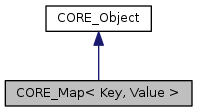
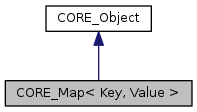
Public Member Functions | |
| CORE_Map () | |
| build a map More... | |
| CORE_Map (const CORE_Map< Key, Value > &m) | |
| copy a map More... | |
| virtual | ~CORE_Map () |
| destroy a map More... | |
| void | getSharedPointer (boost::shared_ptr< CORE_Map< Key, Value > > &p) |
| return the shared pointer corresponding to the class with casting More... | |
| void | getSharedPointer (boost::shared_ptr< const CORE_Map< Key, Value > > &p) const |
| return the shared pointer corresponding to the class whith casting More... | |
| const Value & | operator[] (const Key &k) const |
| get object corresponding to key More... | |
| Value & | operator[] (const Key &k) |
| get object corresponding to key More... | |
| tBoolean | exists (const Key &k) const |
| exists return true if the key exists in map More... | |
| const Value * | get (const Key &k) const |
| get the value at key k More... | |
| Value * | get (const Key &k) |
| get the value at key k More... | |
| int | size () const |
| return the size of the array More... | |
| int | getSize () const |
| return the size of the array More... | |
| void | values (CORE_Vector< Value > &vals) const |
| return an array of values More... | |
| void | getValues (CORE_Vector< Value > &vals) const |
| return an array of values More... | |
| void | getValues (CORE_Array< Value > &vals) const |
| return an array of values More... | |
| void | getValues (vector< Value > &vals) const |
| return an array of values More... | |
| void | keys (CORE_Vector< Key > &ks) const |
| return an array of keys More... | |
| void | getKeys (vector< Key > &ks) const |
| return a vector of keys More... | |
| void | getKeys (CORE_Vector< Key > &ks) const |
| return a vector of keys More... | |
| void | getKeys (CORE_Array< Key > &ks) const |
| return a vector of keys More... | |
| template<class K2 , class V2 > | |
| void | copy (const CORE_Map< K2, V2 > &mapCpy) |
| copy a map More... | |
| void | put (const Key &k, const Value &v) |
| set the value at the index k More... | |
| void | add (const Value &v) |
| set the value at the index k More... | |
| tBoolean | remove (const Key &k) |
| remove the key More... | |
| tBoolean | removeValue (const Value &k) |
| remove the value More... | |
| void | clear () |
| clear the map More... | |
| void | begin () |
| begin More... | |
| tBoolean | hasNext () const |
| had next More... | |
| void | next (Key &k, Value *&v) |
| had next More... | |
| void | merge (const CORE_Map< Key, Value > &m) |
| merge the map More... | |
| void | getSharedPointer (SP::CORE_Object &p) |
| get the shared pointer of this class into p More... | |
| void | getSharedPointer (SPC::CORE_Object &p) const |
| get the shared pointer of this class into p More... | |
| tString | getClassName () const |
| return the class name of the object More... | |
| tString | getIdentityString () const |
| return the identity string of the object of the form className_at_address More... | |
| tString | getPointerAddress () const |
| return the identity string of the object More... | |
| template<class T > | |
| tBoolean | isInstanceOf () const |
| return true if the object is an instance of T More... | |
| virtual tString | toString () const |
| return the string representation of the object node More... | |
| virtual void | print () |
| print the class More... | |
| virtual ostream & | print (ostream &out) const |
| print the class More... | |
| virtual void | print (const tString &message) |
| print the class More... | |
| virtual void | print (const tInteger &str) |
| print More... | |
| virtual void | print (const tRelativeInteger &str) |
| print More... | |
| virtual void | print (const tReal &str) |
| print More... | |
| virtual void | print (const int &str) |
| print More... | |
Static Public Member Functions | |
| static boost::shared_ptr < CORE_Map< Key, Value > > | New () |
| return a CORE_Array shared pointer More... | |
| static tString | getClassName (const tString &identityString) |
| return the class name of the object using only the identity string More... | |
| template<class T > | |
| static tString | getTypeName () |
| get type name More... | |
| static tBoolean | is64Architecture () |
| return true if the machine is a 64 bits machine More... | |
| static tBoolean | is32Architecture () |
| return true if the machine is a 32 bits machine More... | |
| static tString | pointer2String (const void *obj) |
| return the string represantation of a pointer More... | |
| static void | setOutput (ostream &out) |
| set output More... | |
| static ostream & | getOutput () |
| get output More... | |
| static void | printObjectsInMemory () |
| print object in memory More... | |
| static ostream & | print (ostream &out, const tString &message) |
| print the class More... | |
| static void | outputPrint (const tString &message) |
Static Public Attributes | |
| static tBoolean | mIsMemoryTesting =false |
| indicator to store all classes created and deleted only for debuging version More... | |
Protected Member Functions | |
| void | setThis (SP::CORE_Object p) |
| set this weak shared pointer called toDoAfterThis setting method More... | |
| virtual void | setType (tString type) |
| set the type of the object More... | |
| virtual void | toDoAfterThisSetting () |
| method called after setThis() method this method can oly be called once. More... | |
Detailed Description
template<class Key, class Value>
class CORE_Map< Key, Value >
this class describes a map
Constructor & Destructor Documentation
| CORE_Map< Key, Value >::CORE_Map | ( | const CORE_Map< Key, Value > & | m | ) |
copy a map
References CORE_Map< Key, Value >::get(), CORE_Map< Key, Value >::getKeys(), CORE_Map< Key, Value >::keys(), and CORE_Map< Key, Value >::put().
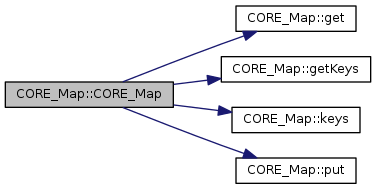
Member Function Documentation
|
inline |
set the value at the index k
|
inline |
begin
|
inline |
clear the map
| void CORE_Map< Key, Value >::copy | ( | const CORE_Map< K2, V2 > & | mapCpy | ) |
copy a map
References CORE_Map< Key, Value >::get(), and CORE_Map< Key, Value >::getKeys().

exists return true if the key exists in map
| const Value * CORE_Map< Key, Value >::get | ( | const Key & | k | ) | const |
get the value at key k
- Returns
- null if no corresponding key
References null.
Referenced by CORE_Map< Key, Value >::copy(), CORE_Map< Key, Value >::CORE_Map(), and CORE_Map< Key, Value >::merge().
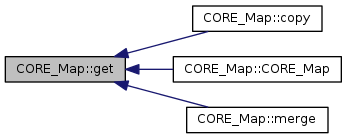
| Value * CORE_Map< Key, Value >::get | ( | const Key & | k | ) |
return the class name of the object using only the identity string
Referenced by CORE_Object::printObjectsInMemory().

|
inherited |
return the class name of the object
- Returns
- the class name of the object
References tString.
Referenced by CORE_Object::getIdentityString().
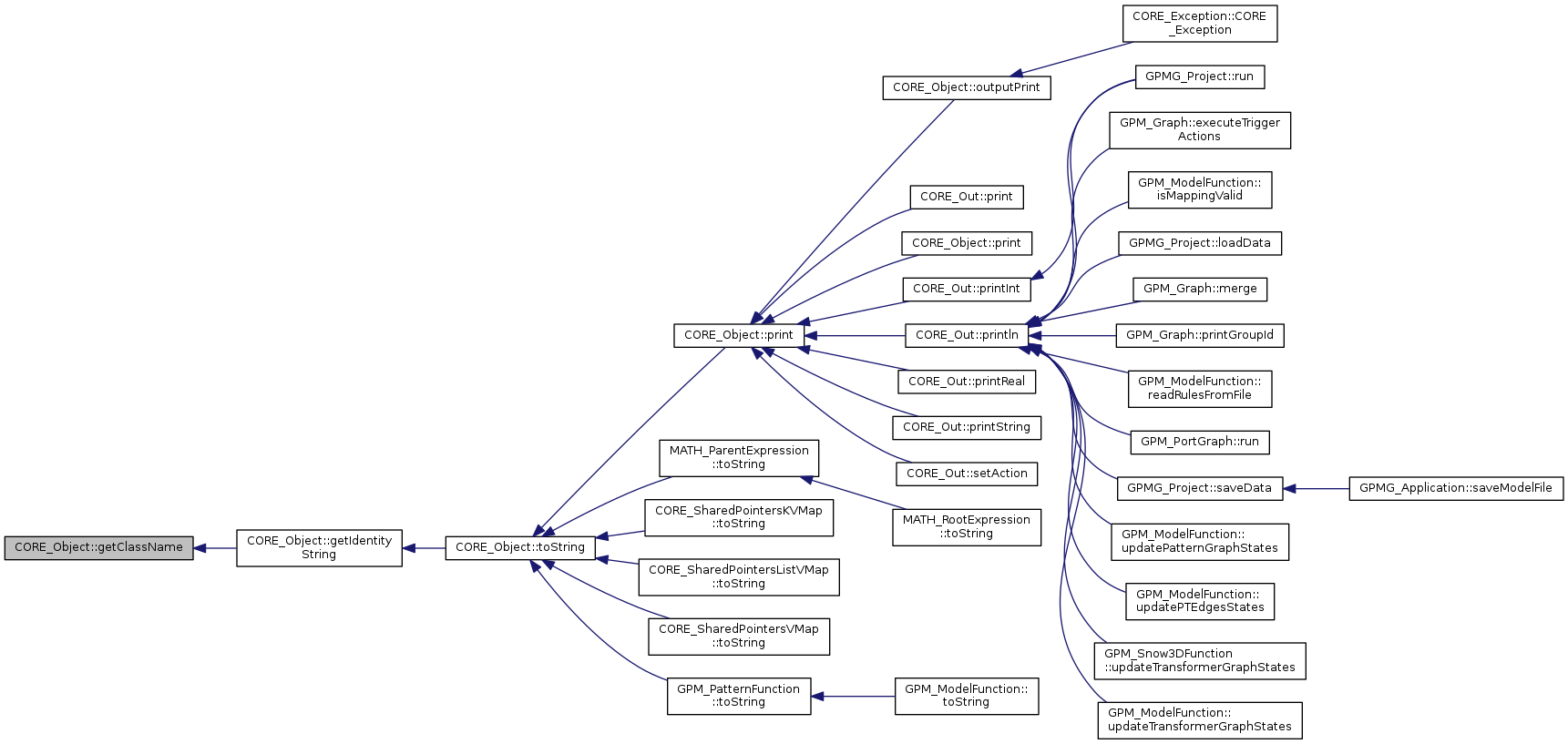
|
inlineinherited |
return the identity string of the object of the form className_at_address
- Returns
- the identity string of the object
References CORE_Object::getClassName(), CORE_Object::pointer2String(), and tString.
Referenced by CORE_Object::toString().

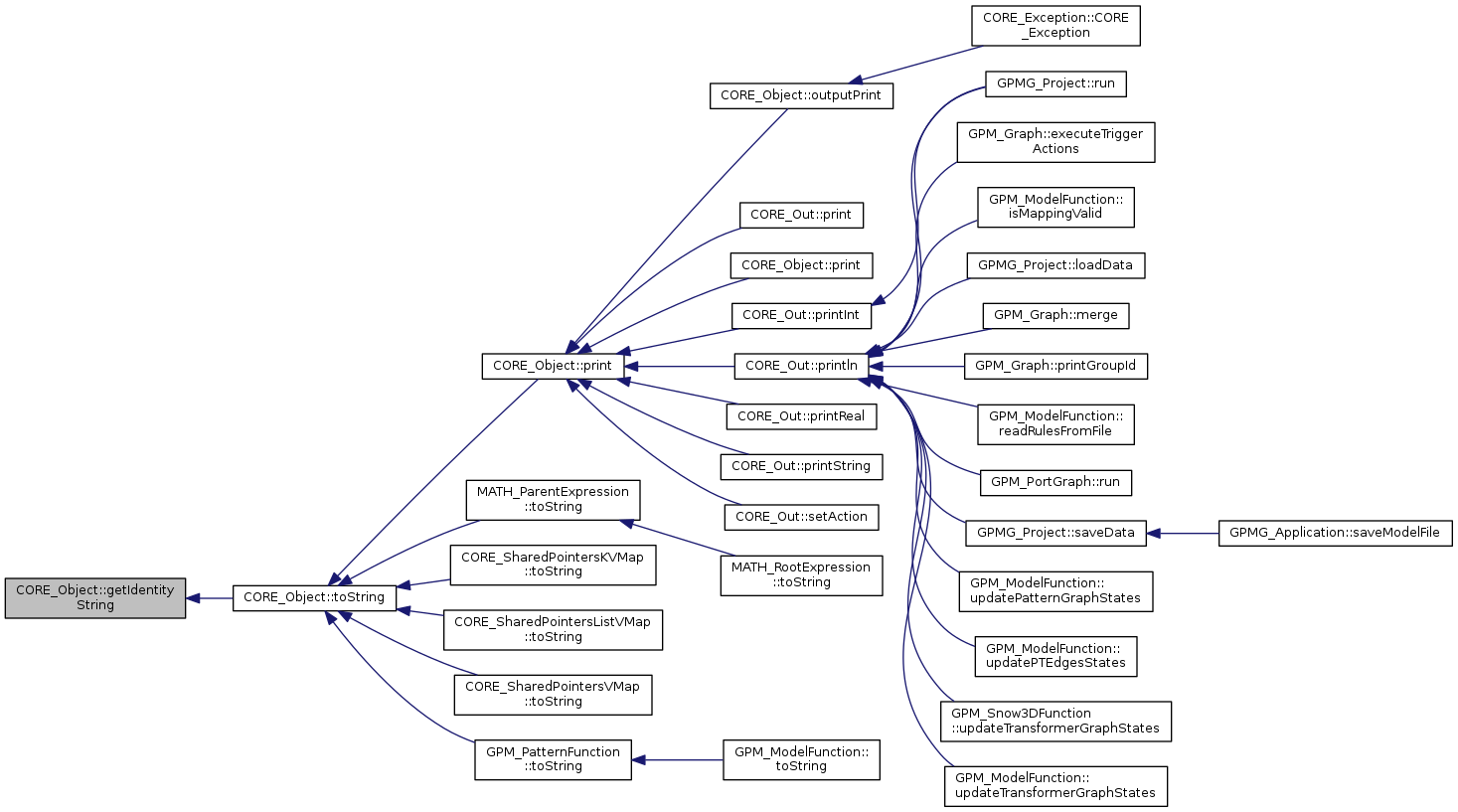
| void CORE_Map< Key, Value >::getKeys | ( | vector< Key > & | ks | ) | const |
return a vector of keys
Referenced by CORE_Map< Key, Value >::copy(), CORE_Map< Key, Value >::CORE_Map(), and CORE_Map< Key, Value >::merge().
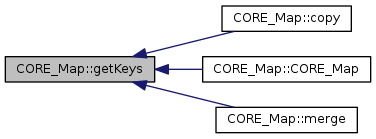
| void CORE_Map< Key, Value >::getKeys | ( | CORE_Vector< Key > & | ks | ) | const |
return a vector of keys
References CORE_Vector< T >::add(), and CORE_Vector< T >::clear().

| void CORE_Map< Key, Value >::getKeys | ( | CORE_Array< Key > & | ks | ) | const |
return a vector of keys
References CORE_Array< T >::add(), and CORE_Array< T >::clear().

|
inlinestaticinherited |
get output
|
inlineinherited |
return the identity string of the object
- Returns
- the identity string of the object
References CORE_Object::pointer2String().

|
inline |
return the shared pointer corresponding to the class with casting
References CORE_Object::getSharedPointer().

|
inlineinherited |
get the shared pointer of this class into p
Referenced by MATH_ParentExpression::addArgument(), GPMG_EnvironmentPanel::componentClicked(), GPM_GraphElement::copy(), CORE_Map< Key, Value >::getSharedPointer(), CORE_Array< T >::getSharedPointer(), CORE_Vector< T >::getSharedPointer(), CORE_Matrix< T >::getSharedPointer(), CORE_Object::printObjectsInMemory(), MATH_ParentExpression::setArgument(), GPMG_EnvironmentPanel::setEnvironment(), GPM_GraphElement::setGraph(), GPMG_GraphElementWindow::setGraphElement(), GPMG_ShowGraphDrawPanel::showGraph(), and GPMG_RuleGraphDrawPanel::showRule().
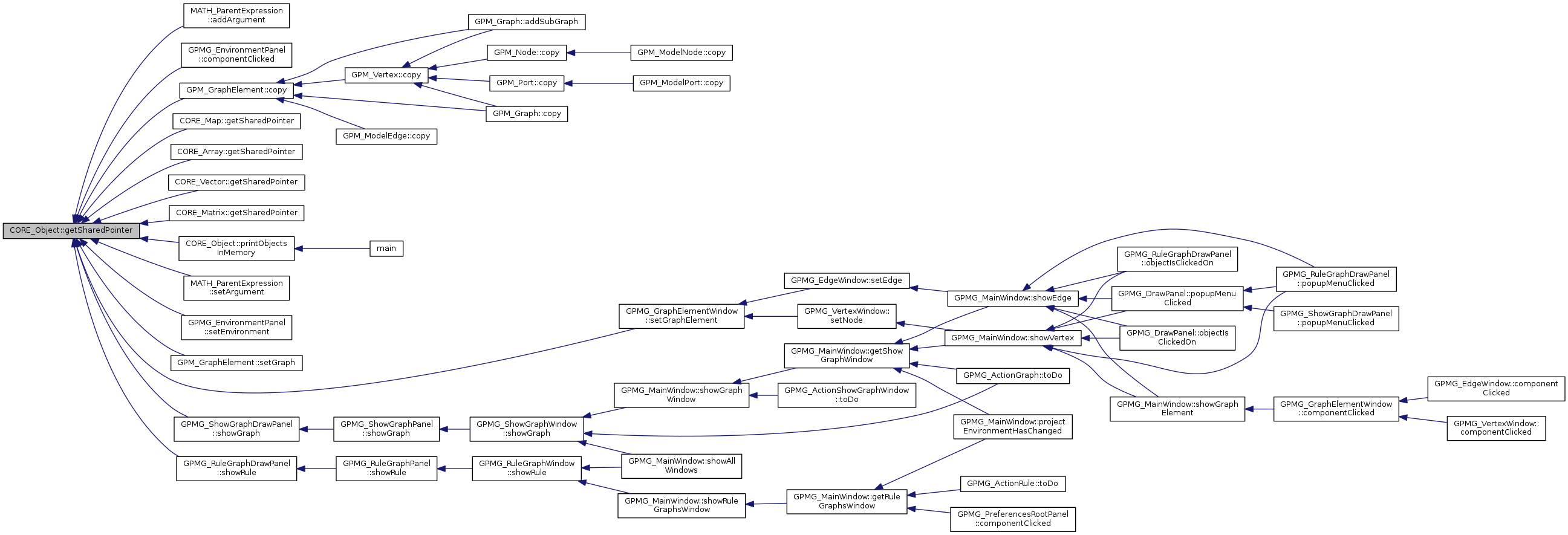
|
inline |
return the shared pointer corresponding to the class whith casting
References CORE_Object::getSharedPointer().

|
inlineinherited |
get the shared pointer of this class into p
|
inline |
return the size of the array
|
inlinestaticinherited |
get type name
References tString.
| void CORE_Map< Key, Value >::getValues | ( | CORE_Vector< Value > & | vals | ) | const |
return an array of values
References CORE_Vector< T >::clear(), CORE_Vector< T >::set(), CORE_Vector< T >::setSize(), and tInteger.
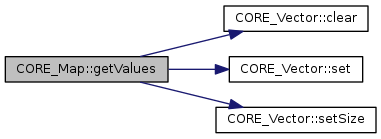
| void CORE_Map< Key, Value >::getValues | ( | CORE_Array< Value > & | vals | ) | const |
return an array of values
References CORE_Array< T >::clear(), CORE_Array< T >::set(), CORE_Array< T >::setSize(), and tInteger.

| void CORE_Map< Key, Value >::getValues | ( | vector< Value > & | vals | ) | const |
return an array of values
References tInteger.
|
inlinestaticinherited |
return true if the machine is a 32 bits machine
References CORE_Object::is64Architecture().

|
staticinherited |
return true if the machine is a 64 bits machine
Referenced by CORE_Object::is32Architecture().

|
inlineinherited |
return true if the object is an instance of T
References null.
Referenced by MATH_BinaryOperator::insertInTree(), MATH_UnaryOperator::insertInTree(), and MATH_EndBlock::insertInTree().
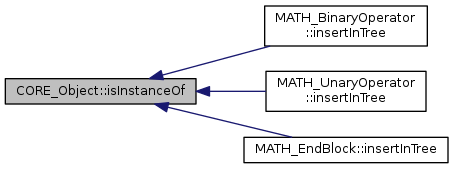
|
inline |
return an array of keys
Referenced by CORE_Map< Key, Value >::CORE_Map().

| void CORE_Map< Key, Value >::merge | ( | const CORE_Map< Key, Value > & | m | ) |
merge the map
References CORE_Map< Key, Value >::get(), and CORE_Map< Key, Value >::getKeys().

|
inlinestatic |
return a CORE_Array shared pointer
|
inline |
had next
|
inline |
get object corresponding to key
References ASSERT_IN.
|
inline |
get object corresponding to key
References ASSERT_IN.
|
staticinherited |
print on output
References null, and CORE_Object::print().
Referenced by CORE_Exception::CORE_Exception().


|
staticinherited |
return the string represantation of a pointer
References tString.
Referenced by CORE_Object::CORE_Object(), CORE_Object::getIdentityString(), CORE_Object::getPointerAddress(), and CORE_Object::~CORE_Object().
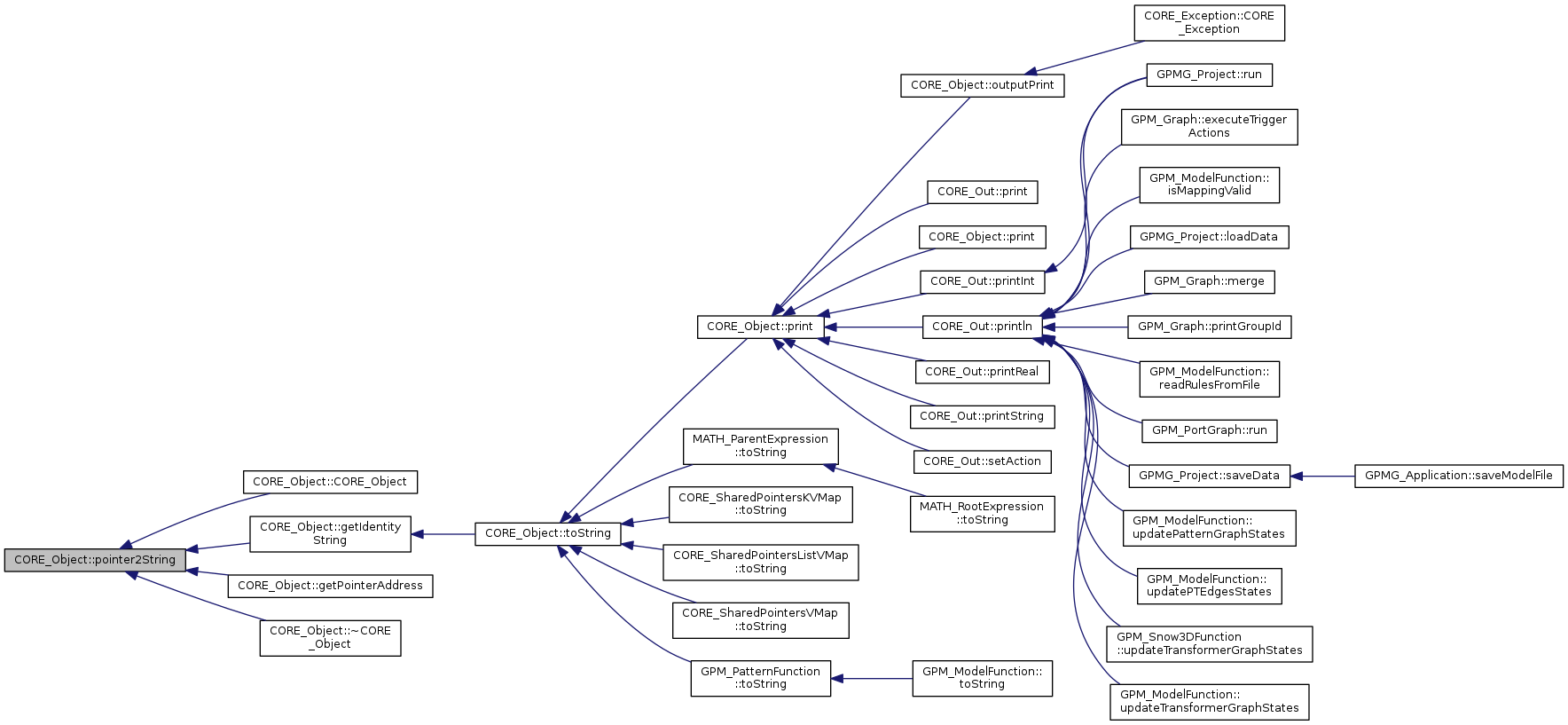
|
inlinevirtualinherited |
print the class
References CORE_Object::toString().
Referenced by CORE_Object::outputPrint(), CORE_Out::print(), CORE_Object::print(), CORE_Out::printInt(), CORE_Out::println(), CORE_Out::printReal(), CORE_Out::printString(), and CORE_Out::setAction().

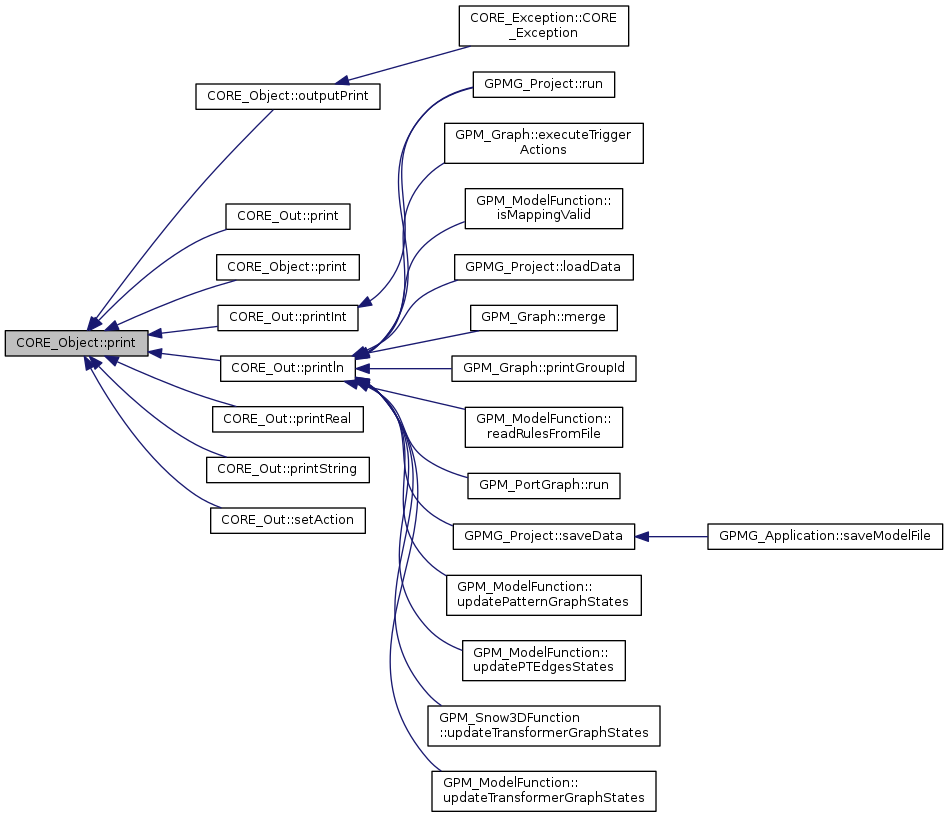
|
inlinevirtualinherited |
print the class
References CORE_Object::print(), and CORE_Object::toString().

|
virtualinherited |
print the class
Reimplemented in CORE_Out.
References null, and CORE_Object::print().

|
virtualinherited |
References null.
|
virtualinherited |
References null.
|
inlinestaticinherited |
print the class
|
staticinherited |
print object in memory
References CORE_Object::getClassName(), CORE_Object::getSharedPointer(), and CORE_Object::mIsMemoryTesting.
Referenced by main().


|
inline |
set the value at the index k
Referenced by CORE_Map< Key, Value >::CORE_Map().

remove the key
- Returns
- true if the removing success and false if the element does not exist in the map at key k
remove the value
- Returns
- true if the removing success and false if the element does not exist in the map
References tBoolean.
|
inlinestaticinherited |
set output
|
inlineprotectedinherited |
set this weak shared pointer called toDoAfterThis setting method
References CORE_Object::toDoAfterThisSetting().

|
inlineprotectedvirtualinherited |
set the type of the object
Referenced by CORE_CommandLine::CORE_CommandLine(), CORE_IO::CORE_IO(), GPM_2DSnowGraph::GPM_2DSnowGraph(), GPM_BGLTest::GPM_BGLTest(), GPM_ClassFactory::GPM_ClassFactory(), GPM_ConwayFunction::GPM_ConwayFunction(), GPM_ConwayGraph::GPM_ConwayGraph(), GPM_CoreRun::GPM_CoreRun(), GPM_CoreTest::GPM_CoreTest(), GPM_Edge::GPM_Edge(), GPM_ExamplesRun::GPM_ExamplesRun(), GPM_Function::GPM_Function(), GPM_Graph::GPM_Graph(), GPM_GraphElement::GPM_GraphElement(), GPM_ModelGraph::GPM_ModelGraph(), GPM_Node::GPM_Node(), GPM_Object::GPM_Object(), GPM_PatternFunction::GPM_PatternFunction(), GPM_Port::GPM_Port(), GPM_PortGraph::GPM_PortGraph(), GPM_Snow2DFunction::GPM_Snow2DFunction(), GPM_Snow3DFunction::GPM_Snow3DFunction(), GPM_Vertex::GPM_Vertex(), and MATH_ExpressionRun::MATH_ExpressionRun().
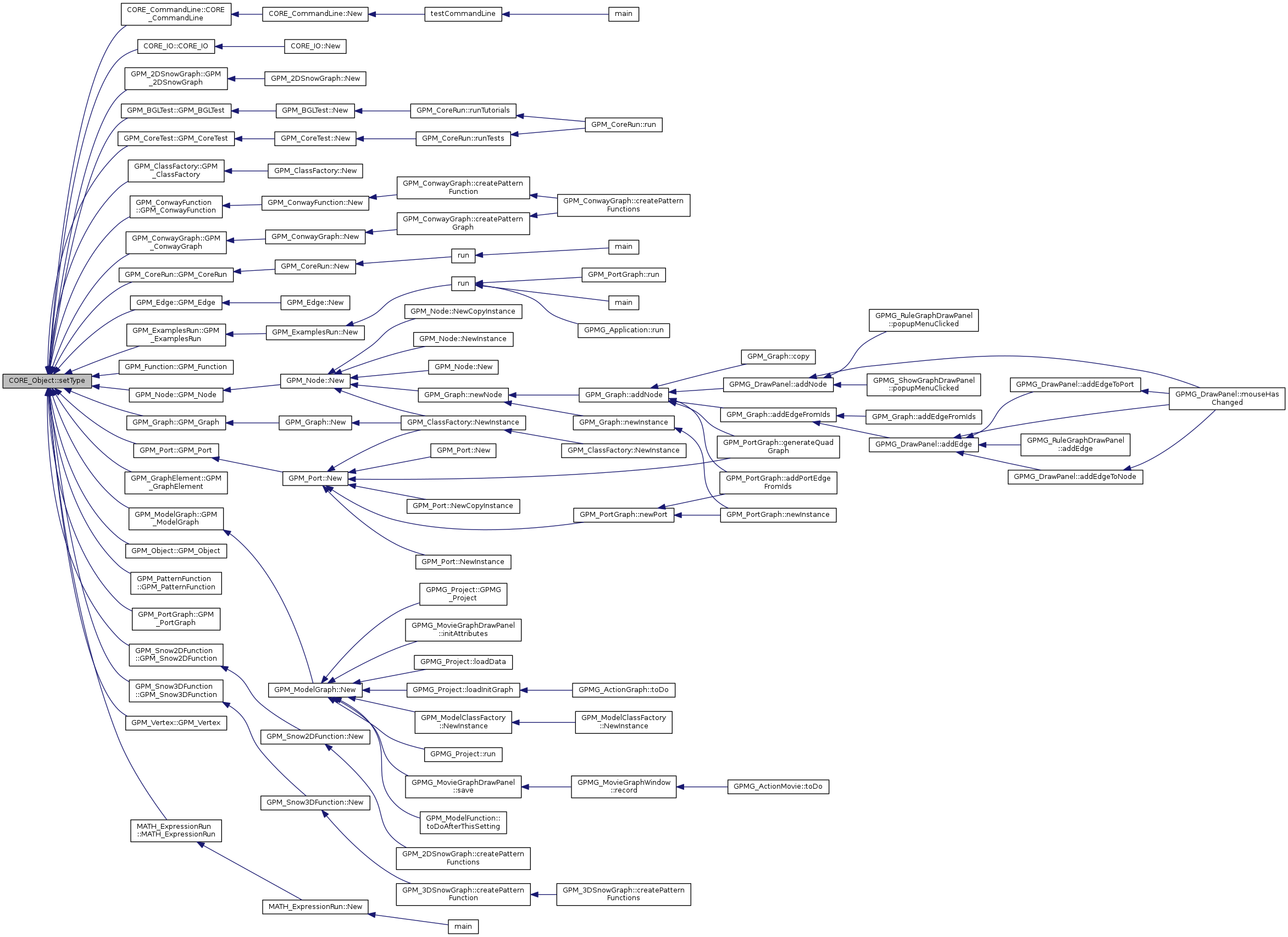
|
inline |
return the size of the array
|
inlineprotectedvirtualinherited |
method called after setThis() method this method can oly be called once.
Reimplemented in GPM_2DSnowGraph, GPMG_EnvironmentWindow, GPM_GraphElement, GPM_ModelFunction, GPM_ModelGraph, GPMG_RuleGraphWindow, GPMG_MovieGraphWindow, GPMG_ShowGraphWindow, and GPM_Function.
Referenced by CORE_Object::setThis(), GPM_ModelGraph::toDoAfterThisSetting(), GPM_GraphElement::toDoAfterThisSetting(), and GPM_2DSnowGraph::toDoAfterThisSetting().
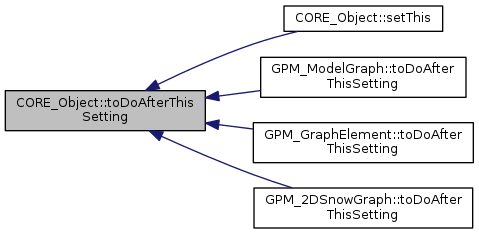
|
virtualinherited |
return the string representation of the object node
- Returns
- the string representation of the object node
Reimplemented in CORE_Time, CORE_Vector< T >, CORE_Array< T >, GPM_PatternFunction, GPM_Graph, CORE_Array2D< T >, GPM_GraphElement, MATH_Variable, CORE_Color, CORE_Matrix< T >, GPM_ModelFunction, CORE_SharedPointersVMap< Key, Value >, CORE_SharedPointersVMap< tString, const CORE_Object >, CORE_SharedPointersVMap< tString, CORE_Object >, CORE_SharedPointersListVMap< Key, Value >, GPM_Rule, CORE_SharedPointersKVMap< Key, Value >, GPM_Variable, GPM_Vertex, MATH_Environment, MATH_ParentExpression, MATH_RootExpression, MATH_LeafExpression, CORE_String, MATH_FunctionNode, CORE_Integer, GPM_Edge, CORE_Array3D< T >, GPM_Port, GPM_Node, MATH_UnaryOperator, CORE_Complex, MATH_BinaryOperator, and CORE_Real.
References CORE_Object::getIdentityString().
Referenced by CORE_Object::print(), MATH_ParentExpression::toString(), CORE_SharedPointersKVMap< Key, Value >::toString(), CORE_SharedPointersListVMap< Key, Value >::toString(), CORE_SharedPointersVMap< Key, Value >::toString(), and GPM_PatternFunction::toString().

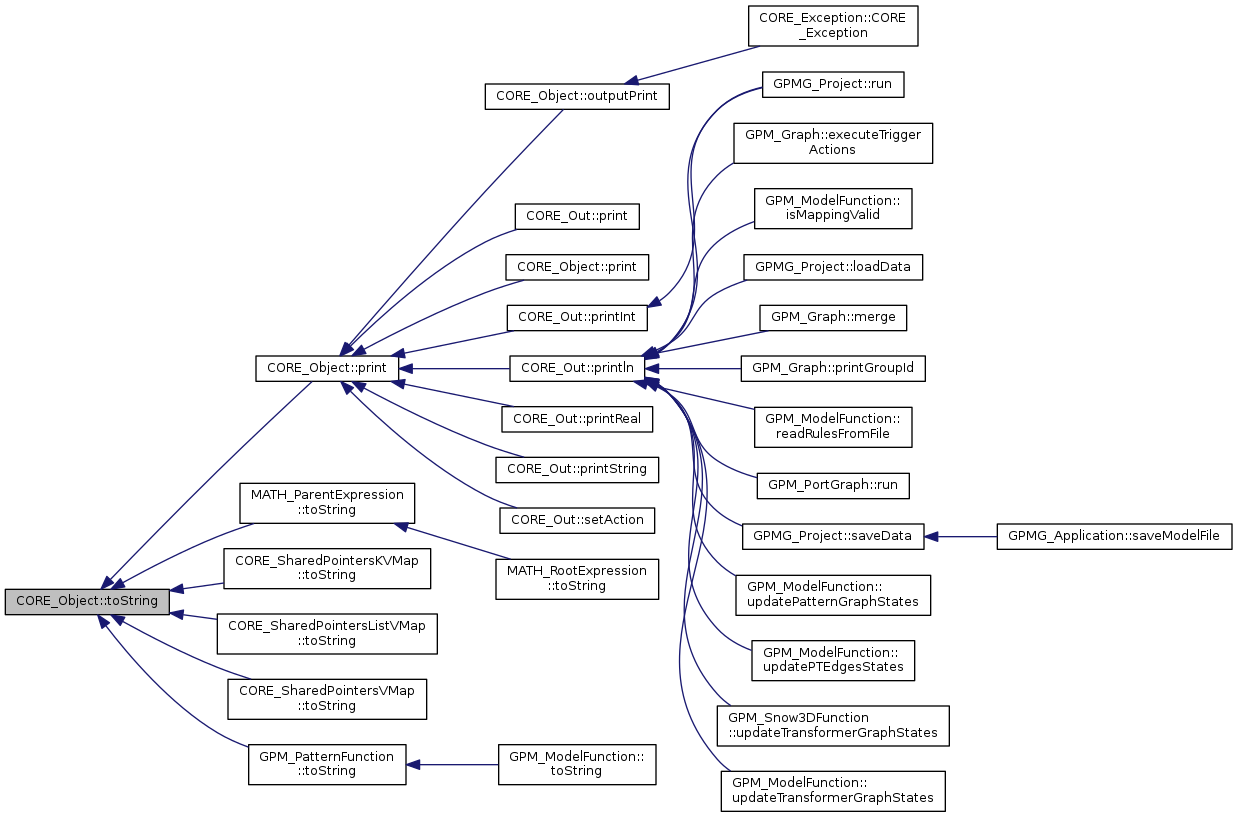
|
inline |
return an array of values
Member Data Documentation
|
staticinherited |
indicator to store all classes created and deleted only for debuging version
Referenced by CORE_Object::CORE_Object(), main(), CORE_Object::printObjectsInMemory(), and CORE_Object::~CORE_Object().
The documentation for this class was generated from the following files:
 1.8.8
1.8.8